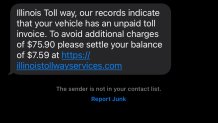
UPDATE: Phishing texts from area code 438 were reported across Illinois in August. Our latest story can be found here. Our original story continues below.
Did you receive a text from the "Illinois Toll way" about an unpaid toll? You might want to pay close attention.
Over the Fourth of July holiday week, several residents reported receiving a text message about an unpaid toll.
"Our records indicate that your vehicle has an unpaid toll invoice," the message read in some cases, urging drivers to click a url to "settle your balance."

The message comes from the "Illinois Toll way," an indication the real Illinois Tollway says is the mark of a phishing scam.
"The Illinois Tollway is advising I-PASS customers to disregard phishing texts being sent to their phones from “Illinois toll way” that detail a specific outstanding toll amount. If you receive a text and are unsure, please check your account online at www.illinoistollway.com or call our customer service center at 1-800-UC-IPASS," a notice on the agency's website reads.
Local
The agency urges anyone who receives such text messages to "delete any text that you receive stating an outstanding toll amount."
"The Tollway has been informed that this is a phishing scam claiming that recipients owe money for unpaid tolls," the agency stated.
Feeling out of the loop? We'll catch you up on the Chicago news you need to know. Sign up for the weekly Chicago Catch-Up newsletter.
The agency is also asking customers who receive a suspicious text to report it to the FBI's Internet Crime Complaint Center.
The text resembles messages that sparked a warning from the Illinois Tollway earlier this year.
In March, some reported on social media that they had received text messages from an out of state number, claiming they had unpaid tolls owed to the agency. The Illinois Tollway confirmed the texts, specifically targeting I-PASS customers, were phishing-related.
"The Illinois Tollway worked immediately this weekend with the Illinois Department of Innovation and Technology and the appropriate federal authorities to take down the phony website responsible for the phishing texts that were sent to some I-PASS customers," a spokesperson from the Illinois Tollway said.
Here's a look at what you should do and questions you should ask if you've received a similar message, according to the Tollway:
WHAT TO DO
- When you recognize a phishing message, do not click on any links or attachments.
- Delete the email message from your Inbox and then empty it from the deleted items folder to avoid accidentally accessing the websites to which it points.
- Forward suspicious emails that appear to be from the Illinois Tollway to info@getipass.com.
WHAT TO LOOK FOR
- Asks for personal information: Many phishing emails request personal information such as credit card or account information, passwords, etc. Legitimate emails will never ask you to perform security-related changes to your account or send emails to collect user names, passwords, email addresses or other personal information through email.
- Official-looking sender's email address: The "From" line may include an email address that appears legitimate.
- False claims: Many phishing emails make false claims about the status of your account and ask you to update or validate your account by clicking on an embedded link in the email. Some may also include a false sense of urgency and state that your account may be in jeopardy if it is not updated immediately.
- Fake links: Many phishing emails include links that look valid but that send you to a spoof site. Never click on these links as the URL (web page address) shown may appear to be legitimate but may actually display a different URL when you hover over the link with your mouse.
- Attachments: Never click on attachments as they may cause you to download spyware or a virus.
- Spelling and poor grammar: Many phishing emails contain typos and poor grammar in the content.
- Scam artists use graphics in email that appear to be connected to legitimate websites but actually take you to phony scam sites or legitimate-looking pop-up windows.
Earlier this year, the Tollway made a major change for I-PASS customers, switching from windshield transponders to stickers.
“The Illinois Tollway is continuing to adopt new tolling technology as it evolves, and I-PASS Sticker Tags mark the latest development in toll collection,” the agency said in a statement in January. “Sticker tags are being adopted by toll agencies across the country and by the Illinois Tollway as they provide a convenient, reliable and less expensive travel experience for our customers.”
More information about I-Pass stickers, and how they work can be found here.



